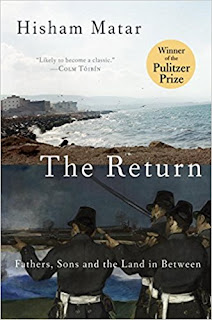Hillbilly Elegy: A Memoir of a Family and Culture in Crisis by J. D. Vance explores the culture of white, working class, Scots-Irish Greater Appalachia--"hillbilly" culture--as both a physical and a psychosocial place. Vance, who grew up in Kentucky and Ohio in the 1980s and 90s, overcame a childhood of poverty and familial instability, becoming a Marine and eventually graduating from Yale Law School. He found himself wondering why there weren't more people like him at places like Yale, people from working-class backgrounds living the American Dream of an upwardly mobile life. What he discovered is a region and a culture in crisis as manufacturing jobs that provided a living wage become harder and harder to find. Vance told Isaac Chotiner of
Slate, "This macroeconomic thing was happening but there was also this cultural and communal disconnect that was happening. To understand the problem you had to understand both sides of it." And so he wrote
Hillbilly Elegy as a memoir to show "what goes on in the lives of real people when the industrial economy goes south. It's about reacting to bad circumstances in the worst way possible. It's about a culture that increasingly encourages social decay instead of counteracting it." What he found is a socially and culturally isolated group that demonstrates a "learned helplessness," an "emotional poverty" that increasingly looks like despair. Vance asks an essential question of "hillbillies like me," and, by implication, of American culture at large: "How much of our lives, good and bad, should we credit to our personal decisions, and how much is just the inheritance of our culture, our families, and our parents who have failed their children? . . . Where does blame stop and sympathy begin?"
What do you think? To what combination of causes does Vance attribute the crisis he sees in his community? How do the people in Vance's life demonstrate both learned helplessness and personal responsibility? What are the positive values of hillbilly culture? To what does Vance attribute his escape from the cycle of poverty, addiction, and violence in which many people in his family and community are trapped? Why is he uneasy with his own rapid upward mobility? Does he seem to make an emotional journey out of his own anger and confusion along with his physical journey out of Appalachia? What does
Hillbilly Elegy add to the national conversation about poverty and its related socio-cultural problems? To the current political conversation? Does it suggest any solutions? Does Vance seem to be more liberal, conservative, libertarian, or some other slant entirely in his social and political views? If your life experiences, cultural background, and social and political views differ from Vance's, did you find
Hillbilly Elegy difficult and/or enlightening to read?
For more insight into
Hillbilly Elegy, read
Compassion, and Criticism, for the White Working Class: A conversation with Hillbilly Elegy author J.D. Vance, an interview at Slate with Isaac Chotiner.
We hope you will join the discussion: Tuesday, June 6, at 6:30 p.m. at Main Library; Thursday, June 15, at 11:00 a.m. at West Ashley Branch Library; and here on the blog.



